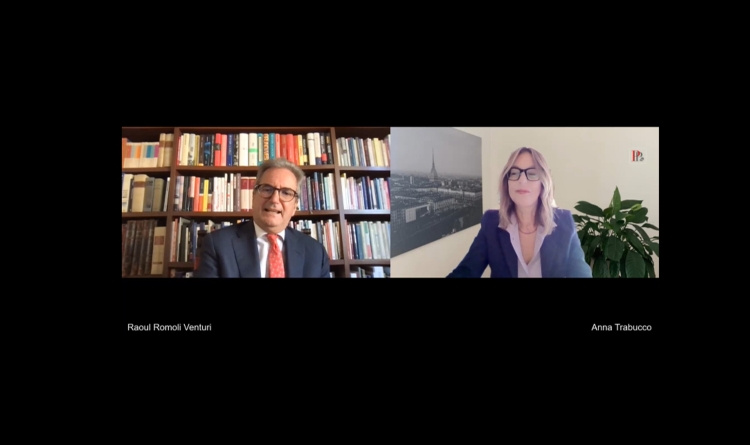Interview with Raul Romoli Venturi

ProPosition is pleased to host today Dr. Raoul Romoli Venturi, a leading figure in the field of corporate communication, with whom we have shared important collaborative experiences over the years.
Q: Raoul Romoli Venturi, a seasoned manager with an interdisciplinary and international background: you began in auditing, then moved into administration, finance and control, and later into institutional relations and communication — working for leading companies such as Price Waterhouse, Bacardi Martini, and Ferrero. Today, you are an entrepreneur and Advisor to the Minister of Culture. Would it be fair to call you a “boomer” with a remarkably contemporary career path?
R: It’s true that my career path may appear very contemporary — multifaceted and requiring constant professional updating — yet it still bears a very “boomer” trait: forty years spent in just three companies, including 19 with Bacardi Martini and 17 with Ferrero. I took full advantage of the internal opportunities for cross-fertilization within these organizations, and each professional experience enriched the next. One clear example: having started my career in administration, finance, and control, I developed a constant need to measure performance through numbers — a mindset not typical in the corporate communications world, which is often guided only by qualitative assessments.
Q: Today, you are best known as Ferrero’s Corporate Communication Director. What does it mean to work in communications today, and how did you decide, at 64, to start your own business and continue working in the field with your family company?
R: It’s true — the public mostly knows me for my 17 years at Ferrero, and I am proud to be associated with such iconic brands as Nutella and Kinder. Inevitably, they add value to my reflections on the profession. Communication is still a professional area with academically undefined boundaries. Unfortunately, there remains much confusion about what a professional communicator actually is, as opposed to others performing similar roles. For example, journalists are often perceived as communicators. In reality, journalism deals with information, which is a distinct — or at least should be a distinct — discipline from communication. Likewise, influencers are often described as communicators, but in truth they are tools of online communication — similar to what in traditional media we would call testimonials or, in more contemporary language, ambassadors.
A corporate communicator tells the story of their company and its products, builds and protects their reputation, and manages relationships with the network of stakeholders connected to the organization. Few people know that UNI, the Italian Standardization Body, has defined the professional communicator’s profile, identifying five main types (corporate, public, political, social, and technical), to which we might add a sixth — the promotional-communication professional. The SAA – School of Management of Turin is currently the only institution authorized to certify professional communicators according to UNI standards. More institutions should be accredited, and this certification deserves broader national diffusion.
At 64 — now 65 — I chose to work independently, to contribute to academic teaching in the field of communication and to collaborate with our family-owned communication firm, supporting clients in developing communication strategies. The decision to go independent stemmed from the desire to continue working beyond the official retirement threshold of 67. To do that, I needed to start before the market began viewing me as “retired.” I enjoy my work immensely — it keeps me energized and professionally current.
Q: Alongside your activities with Romoli Venturi & Partners, you also serve as Advisor to the Minister of Culture. In a recent interview, you described this as a form of “national volunteering.” What do you mean by that?
R: The Minister of Culture, Alessandro Giuli — whom I’ve known for many years, since his time as Deputy Editor and later Co-Editor-in-Chief of Il Foglio — asked me to support him on a topic he knew was close to my heart: cultural policies for Italians abroad, which is also one of the pillars of his government agenda. It’s a subject I wrote a book about over twenty years ago. I accepted the appointment on a voluntary basis, coining the term national volunteering to distinguish it from the more familiar social volunteering.
The goal, shared with the Minister, is to develop the network of a global Italian people — a community that remains ideally tied to its physical homeland, which shapes its identity, yet expresses a widespread cultural and spiritual “Italianity,” accessing a virtual national dimension. Culture must be at the heart of a new political and economic renaissance project that projects Italy beyond its borders — through 120 million ambassadors of Italian tradition across five continents — promoting a model of civilization grounded in beauty, creativity, and dialogue. These are the cornerstones of a lifestyle that fosters peace and wellbeing — a true Olivetti Plan for Culture.
Properly implemented, this project would serve as a powerful tool of soft power, allowing Italy to exert effective and peaceful moral influence in international relations. It would also open the way for a more organically integrable national demography, encouraging a partial return of Italians abroad — not for economic necessity, but through cultural attraction.
In short, we must work to reintegrate into the Italian system that other Italy — the one made up of 60 million “Italics,” as Bassetti calls them, or “oriundi,” a term most know only from football, or simply those of Italian origin whom we know much less. It is a long-term political project that could and should belong to everyone — beyond partisanship — in the sole interest of Italy.
